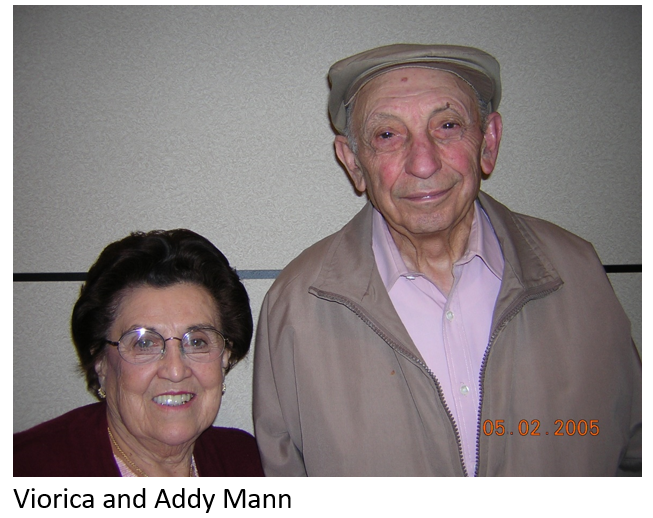Eby Mann
"To not let themselves be treated like animals; they need to be stronger with what they believe in and stand up for their rights."
Name at birth
Viorica Friedmann
Date of birth
10/24/1924
Where were you born?
Where did you grow up?
Oradea, Romania, (border with Hungary, went back and forth between Hungary and Romania)
Name of father, occupation
Eugene Friedmann,
Textiles, then as Manager at a beer factory
Maiden name of mother, occupation
Fanny Policzar,
Worked at Family Grocery Store
Immediate family (names, birth order)
Parents, Alex Friedmann, me and Ava Bartos
How many in entire extended family?
Grandfather from father’s side; two uncles and two aunts alive before the war living in Romania; on my mother’s side, my aunt and uncle, and seven cousins
Who survived the Holocaust?
My father's side survived, they were from Romania and stayed in their homes during the war; on my mother's side, three cousins survived, along with my siblings and me.
I lived with my mother and sister in the village ghetto in Oradea. My brother lived with our aunt in the city ghetto in Oradea.
While living in Oradea my father got sick and my parents went back to Saliste, which was a village. The children stayed with family to go to school in Oradea, which was a city. I was 12 years old. My father died in 1943, the year before we were taken by the Germans.
One day I ran out of the ghetto with the thought of going to the Romania border which was approximately five miles from the ghetto. I ran out of the ghetto and found a previous Hungarian neighbor to ask for help, but they were scared. I then had second thoughts about leaving my mother and sister, I had a “heavy heart”, and so I returned to the ghetto.
In March, 1944 I was taken with my mother and sister to Auschwitz; my mother was killed right away. I was in a barrack with my sister and we remained in Auschwitz for six months. We did not work. Every day at 4:00am we stood outside in the cold to be counted. In October 1944, my sister and I were taken to Mitterstein in Germany to an airplane factory and we worked while the SS watched us. There were a few nice Germans who would leave us sandwiches in the trash. This gave me a renewed hope in humanity. The barracks were about five miles from the factory and we were brought there every day to work. I was with my sister and with my cousin. I was liberated in May 1945. A week before liberation we were transported to another factory in Weisswasser and we worked there one day. The next morning, in May 1945 we were liberated. Russians came and liberated us. Four weeks after the war I went back home and found an uncle but did not find any of my possessions, not even one photograph was left. My uncle from Romania took us; I stayed with him until I married my husband.
I come from an orthodox family and as an adult I was not religious and not kosher, but always celebrated the holidays in memory of my mother and family. I have been a member at Adat Shalom since 1982 when my brother died.
Name of Ghetto(s)
Name of Concentration / Labor Camp(s)
Where did you go after being liberated?
Back to Romania
When did you come to the United States?
My family came to US in 1964. When my son was 1 year old we applied for passports and visas to leave the country, but were denied. In 1964 when my son was 16 years old, we got passports/visas to Israel. We left Oradea on Pesach (Passover) and our flight stopped in Vienna for the week of Pesach. From Vienna, we were taken to Genova, Italy and lived there for six months. They were given money to live and in October 1964 and we came to Detroit to be with my brother. I had not seen my brother for twenty years.
Where did you settle?
Livonia, MI
How is it that you came to Michigan?
My brother, a tool and die maker, lived here. While we were in Vienna my son and husband went to HIAS requesting to go the US since I had a brother in Detroit and we wanted to be together.
Occupation after the war
Seamstress in Alterations, Men's Store
When and where were you married?
1945 in Romania
Spouse
Adalbert Mann,
Butcher at Kroger
Children
George Mann, attorney
Grandchildren
Four
What do you think helped you to survive?
Being with my sister; we took care of each other.
What message would you like to leave for future generations?
To not let themselves be treated like animals; they need to be stronger with what they believe in and stand up for their rights.
Interviewer:
Charles Silow
Interview date:
04/04/2011
To learn more about this survivor, please visit:
The Zekelman Holocaust Center Oral History Collection
http://www.holocaustcenter.org/index.php?option=com_content&task=view&id=263
http://www.holocaustcenter.org/index.php?option=com_content&task=view&id=263
Experiences
Survivor's map

